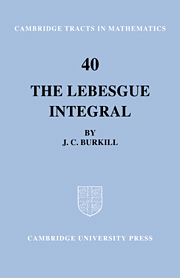Chapter I - SETS OF POINTS
Published online by Cambridge University Press: 23 December 2009
Summary
SETS OF POINTS
The refinements of the differential and integral calculus, which form the topic of this tract, largely depend on the properties of sets of points in one or more dimensions. This chapter contains those properties that will be needed, in so far as they are descriptive and not metrical. The rules of algebra applied to sets hold whether the members of the sets are points or are objects or concepts of any kind. All that we require for a set E to be defined is that we can say of any given object x whether it is or is not a member of E.
The algebra of sets. Let E be a set, † the members of which may be of any nature. The sum of two sets E1, E2 is defined to be the set of objects which belong either to E1 or to E2 (or to both); the sum is written E1 + E2. By definition E2 + E1 is the same as E1 + E2, no question of order being involved. The definition extends to any finite or infinite number of sets, E1 + E2 + … being the set of objects belonging to at least one En. In the definition of an infinite sum there is no appeal to any limiting process.
The product E1E2 … of any number (finite or infinite) of sets E1, E2, … is defined to be the set of objects belonging to every one of the sets En.
Information
- Type
- Chapter
- Information
- The Lebesgue Integral , pp. 1 - 9Publisher: Cambridge University PressPrint publication year: 1951
